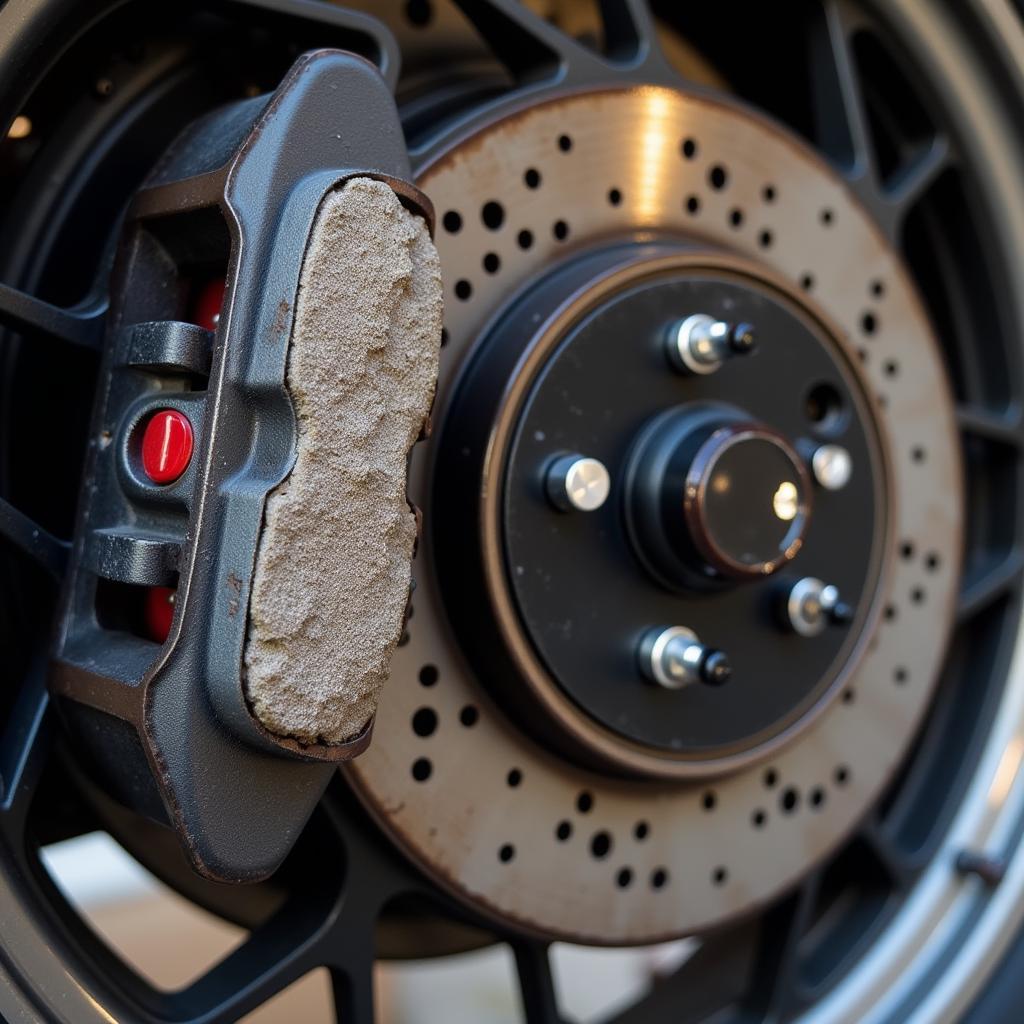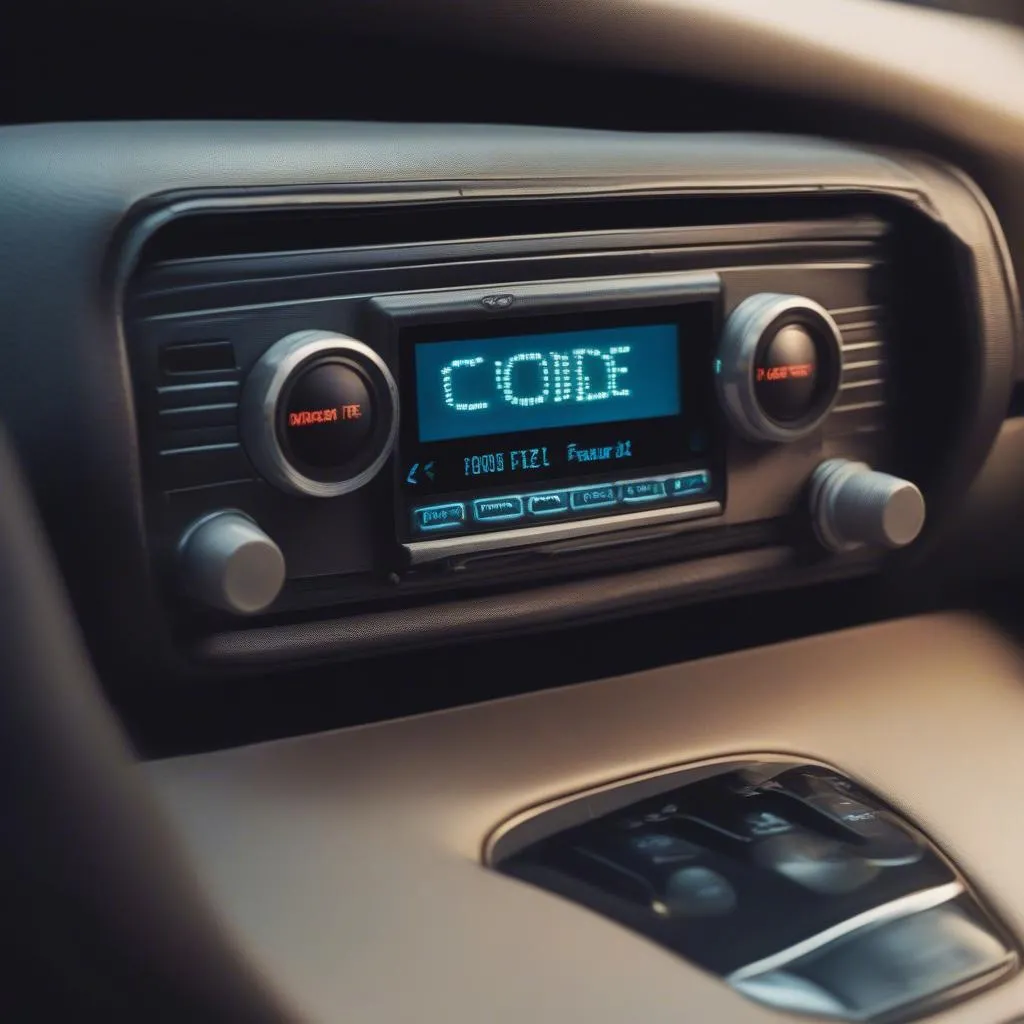The AdBlue warning light on your Nissan is a crucial indicator that something is amiss with your vehicle’s emissions control system. When this light illuminates, it’s vital to understand the underlying issue and take necessary action. This article will guide you through the meaning of the AdBlue warning light, common causes, and potential solutions, helping you address this concern confidently.
Understanding the AdBlue System
The AdBlue system, also known as Selective Catalytic Reduction (SCR), plays a vital role in reducing harmful nitrogen oxides (NOx) emissions from your Nissan’s diesel engine. AdBlue, a solution of urea and deionized water, is injected into the exhaust system where it converts NOx into harmless nitrogen, water, and carbon dioxide.
What Does the AdBlue Warning Light Mean?
The AdBlue warning light, often a blue or yellow icon of a tank or a urea molecule, indicates one of the following:
- Low AdBlue Level: The most common reason for the warning light is a low AdBlue level in the tank. Your Nissan’s system monitors the fluid level and triggers the warning light when it reaches a certain threshold, typically 2.5 liters.
- AdBlue Quality Issue: The AdBlue warning light could indicate a problem with the quality of the AdBlue solution. This could be due to contamination or using a non-approved AdBlue brand.
- AdBlue System Malfunction: The warning light might also signify a problem with the AdBlue system itself, including a faulty sensor, clogged injector, or issues with the control module.
Addressing the AdBlue Warning Light
The best course of action when the AdBlue warning light comes on is to:
- Check the AdBlue Level: First, check the AdBlue level in your tank. Locate the tank, typically near the diesel fuel tank, and consult your vehicle’s manual for instructions on checking the level.
- Refill with AdBlue: If the level is low, immediately refill the AdBlue tank with a high-quality, approved AdBlue solution. You can purchase AdBlue at authorized dealers or online retailers.
- Reset the Warning Light: Once you refill the tank, refer to your vehicle’s manual for instructions on resetting the AdBlue warning light. This typically involves starting the engine and allowing it to idle until the warning light goes out.
- Professional Inspection: If the warning light persists after refilling and resetting, it’s crucial to have your Nissan inspected by a qualified mechanic. They can diagnose the root cause of the problem and make the necessary repairs.
Common Causes of AdBlue Warning Light
Here are some of the most common causes of the AdBlue warning light:
- Using the Wrong AdBlue: Using a non-approved AdBlue solution, such as windshield washer fluid or other chemicals, can severely damage your AdBlue system.
- Contaminated AdBlue: AdBlue is sensitive to contamination. Exposure to dust, dirt, or other impurities can affect its performance.
- Faulty AdBlue Sensor: The sensor that monitors the AdBlue level might malfunction, leading to inaccurate readings and triggering the warning light.
- Clogged AdBlue Injector: Over time, the AdBlue injector can become clogged, preventing the proper injection of AdBlue into the exhaust system.
- AdBlue System Control Module Failure: The AdBlue system is controlled by an electronic module that can malfunction, leading to issues with the system’s operation.
Potential Solutions and Repairs
The solutions and repairs for an AdBlue warning light will depend on the underlying cause. Here are some common interventions:
- Refilling with Approved AdBlue: If the AdBlue level is low, refilling the tank with high-quality AdBlue is the first step.
- Replacing the AdBlue Sensor: A faulty sensor can be replaced by a qualified mechanic.
- Cleaning the AdBlue Injector: A clogged injector can be cleaned or replaced.
- Replacing the AdBlue System Control Module: If the control module fails, it will need to be replaced.
What Happens If You Ignore the AdBlue Warning Light?
Ignoring the AdBlue warning light can have serious consequences:
- Engine Malfunction: If the AdBlue level falls too low, the engine may enter “limp home mode,” restricting its power and performance.
- Emission Failure: The AdBlue system is vital for meeting emission standards. If it malfunctions, your vehicle might fail emission testing.
- Increased Fuel Consumption: A faulty AdBlue system can lead to increased fuel consumption.
- Expensive Repairs: Neglecting the warning light could result in costly repairs to the AdBlue system in the long run.
FAQ (Frequently Asked Questions)
Q: How often should I refill my AdBlue tank?
A: The frequency of refills depends on your driving habits and the size of the AdBlue tank. On average, a full tank of AdBlue can last between 6,000 to 10,000 miles.
Q: Can I use AdBlue from any brand?
A: No. You should only use AdBlue that meets the specifications required by your Nissan. Check your vehicle’s manual for recommended AdBlue brands.
Q: Is it safe to drive with the AdBlue warning light on?
A: You can drive a short distance with the AdBlue warning light on. However, it’s recommended to address the issue as soon as possible to avoid potential engine problems and emission violations.
Q: How much does it cost to fix an AdBlue system problem?
A: The cost of repairs can vary widely depending on the specific issue and the labor costs in your area. Refilling the AdBlue tank is relatively inexpensive, while replacing parts like the sensor or control module can be more costly.
Q: Can I disable the AdBlue system?
A: It’s not recommended to disable the AdBlue system, as it’s an integral part of your Nissan’s emission control system. Doing so could result in legal penalties and environmental harm.
Conclusion
The AdBlue warning light on your Nissan is a crucial signal that something needs your attention. Addressing the issue promptly will help you maintain optimal performance, ensure emission compliance, and avoid costly repairs. If you’re uncertain about the cause of the warning light, consulting a qualified mechanic is always a safe and sensible option.


